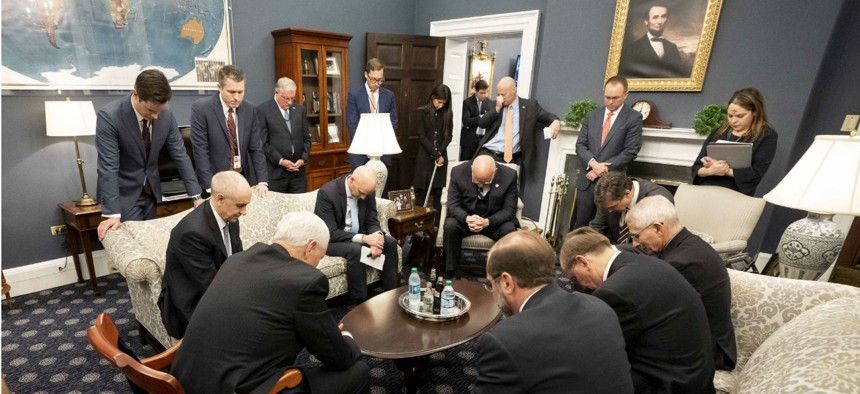
Vice President Mike Pence prays with the President’s Coronavirus Taskforce on Wednesday, February 26. Official White House Photo by D. Myles Cullen
A Message for Trump: When Americans Lose Faith in Government, Presidents Pay a Price
The management failures that swirled around the government’s initial response to Katrina seriously damaged President Bush.
As we sort out the strategies to manage the coronavirus, there’s an important underlying truth: What presidents do in response to a crisis and how their administrations carry out those directives really does matter. A lot. And it matters for a very long time.
Consider the presidency of George W. Bush. In the immediate shadow of the September 11 terrorist attacks, he soared to one of the highest presidential approval ratings in history. It’s scarcely surprising that the score settled back to Earth, but on election day in 2004, he still enjoyed a 4.5 point margin of positives over negatives.
But then the Bush administration struggled with recovery from Hurricane Katrina. The management failures that swirled around the government’s initial response seriously damaged the administration in general—and President Bush in particular.
The Bush presidency was full of ups and downs in public polling. But the point where Bush’s negatives exceeded the positives, never to recover, was Katrina.
The lesson is clear. Public opinion might be fickle. However, it’s hyper-sensitive to problems of government trust and performance. And when problems of performance lead to the decline in trust, it can prove difficult—even impossible—to recover. And first steps often leave long-lasting impressions.

Donald F. Kettl is the Sid Richardson Professor at the LBJ School of Public Affairs at the University of Texas at Austin. He is the author of The Divided States of America: Why Federalism Doesn’t Work (Princeton University Press). He can be reached at kettl@austin.utexas.edu.







